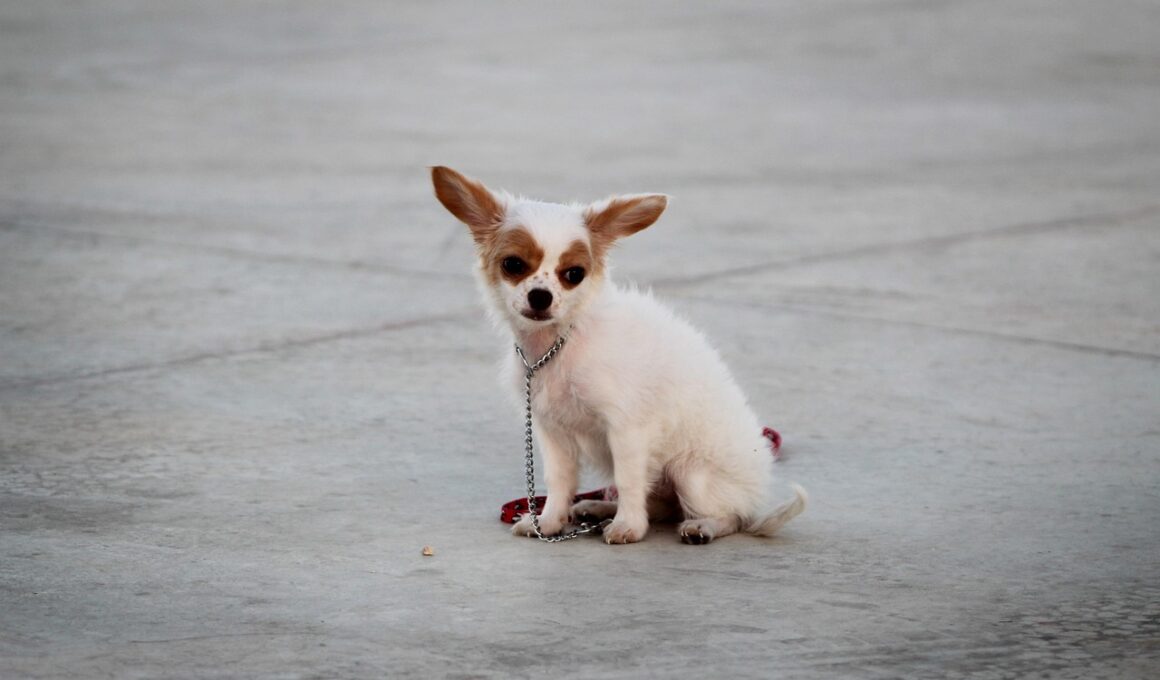Training Puppies for Better Mental Health Outcomes
Training puppies is not just about teaching them commands; it significantly influences their mental health. Pup training techniques can lead to a happier, more balanced dog. One effective method includes the use of positive reinforcement. This technique emphasizes rewarding desired behaviors, which encourages puppies to repeat those behaviors. For example, when a puppy sits on command, rewarding it with praise or a treat reinforces that act. Consistency is crucial; using the same commands and rewards can strengthen learning. Another essential technique is socialization. Introducing puppies to various environments, people, and other pets early on can reduce anxiety. Socialization allows dogs to adapt to situations, lowering their stress levels and boosting confidence. Activities like puppy classes provide not only training but also help with social skills. Furthermore, engaging in mental stimulation activities is vital. Providing puzzle toys and interactive games can keep puppies mentally sharp and prevent boredom-related behavior issues. In conclusion, training your puppy with these effective techniques can set a solid foundation for their mental health throughout life. Every step taken during early training creates an enduring impact on their overall well-being and happiness.
Consistency in training is paramount for a puppy’s mental health and development. When owners establish a clear routine, puppies feel more secure within their environment. A well-structured day includes specific times for feeding, playing, and training sessions. This predictability helps reduce anxiety, as puppies learn what to expect. Additionally, incorporating fun and variety into training keeps sessions engaging. Using diverse training tools and methods, such as clickers or agility equipment, can pique a puppy’s interest. Mixing up the types of training, like obedience, tricks, and agility, also allows for a comprehensive skill set to develop. Positive interactions strengthen the bond between the puppy and the owner. This bond creates trust, encouraging the puppy to look to the owner for direction and support. Regular progress checks should be performed to ensure that techniques are effective. If challenges arise, adjusting techniques is essential to prevent frustration. Moreover, seeking advice from professional trainers can offer new insights and solutions. Online resources or local training groups can provide further guidance. Ultimately, consistency and love throughout the training process are integral in enhancing a puppy’s mental health.
The Importance of Socialization
Socialization is a critical aspect of training that greatly benefits puppies. Early exposure to various experiences, people, and environments can help reduce fear and aggression in later life. A well-socialized puppy becomes happier and more confident, which positively contributes to their overall mental health. Implementing structured socialization sessions can introduce puppies to different situations in a controlled manner. Arranging playdates with other friendly dogs provides opportunities for playful interactions. Puppy kindergarten classes offer valuable social experiences in a safe environment, teaching essential skills. Exposure to different sounds, sights, and smells also aids in acclimating puppies to their surroundings. Engaging with diverse groups of people can reduce fear of strangers, making them more approachable. Continuous socialization into adulthood is important, too. Regular outings to parks or pet-friendly places can keep experiences fresh and exciting. Moreover, varying the locations and situations puppies are exposed to ensures they adapt adequately to changes. Consequently, this adaptability fosters resilience, which translates to better mental health. Regular interaction and positive experiences facilitate a strong foundation for dogs, promoting well-rounded and mentally healthy companions.
Incorporating play into training sessions is an excellent method for improving a puppy’s mental well-being. Playtime is not just enjoyable for your dog but is also essential for their cognitive development. Engaging activities, such as tug-of-war or fetch, enhance their problem-solving abilities and physical health. Varying play activities can keep your puppy stimulated and prevent boredom. Puzzle toys can challenge their intellect, keeping their minds active. Training sessions infused with play create positive learning environments, enticing puppies to concentrate and absorb information. During these playful moments, puppies are more likely to express their natural instincts, learning social behaviors through interaction with other pets. This engaged play can reduce stress and anxiety, providing an excellent outlet for energy. To maximize the benefits of these sessions, be mindful of the duration and intensity. Short, frequent sessions are often more effective than long ones, ensuring that training remains a positive experience. Additionally, using toys that your puppy enjoys can further reinforce learning outcomes. Overall, play should be seen as an integral part of training, promoting both mental stimulation and emotional well-being for puppies.
Positive Reinforcement Techniques
Implementing positive reinforcement techniques is fundamental when training puppies. This approach not only aids in teaching commands but also boosts their overall confidence and mental health. When using this method, owners reward desired behaviors, reinforcing them positively. Rewards can range from treats and toys to verbal praise or affection. Timing is crucial; giving rewards promptly after the desired behavior helps the puppy associate the action with a positive outcome. Gradually reducing treats while maintaining praise strengthens their learning long-term. Training should be enjoyable for both the puppy and owner. Keeping a light-hearted atmosphere encourages puppies to relax, facilitating learning. Furthermore, it builds an enjoyable bond between owner and pet, leading to a trusting relationship. Positive reinforcement diminishes fear-based responses, allowing puppies to learn in a stress-free environment. Including a variety of rewards can prevent the training from becoming monotonous for both parties. Incorporating games with rewards can enhance learning experiences, making sessions engaging. This bonding during training sessions fosters a positive mindset, promoting better mental health as puppies grow. In essence, positive reinforcement is vital for effective training and nurturing a mentally healthy dog.
Using desensitization techniques proves beneficial for puppies with heightened anxiety levels. Gradual exposure to the causes of their stress, coupled with positive reinforcement, can significantly alleviate their fears. For instance, if a puppy is fearful of loud noises, owners can start by exposing them to soft sounds. Gradually increasing the volume while providing treats can help the puppy associate these sounds with positive experiences. Consistency during desensitization helps to reinforce their bravery, slowly overcoming their anxiety. Progress can be monitored, adjusting exposure as needed. Patience is crucial during this process, as building confidence takes time. Additionally, creating a safe space can significantly aid in managing anxiety. Designating a quiet area in the home where the puppy can retreat permits them to feel secure. Plush beds, safe toys, and calming scents like lavender can enhance this environment. Socializing in a controlled setting with other calm dogs can also reinforce positive experiences. Engaging in interactive play in these sessions can encourage relaxed behavior. Witnessing incremental progress in overcoming fears is rewarding for owners, leading to improved mental health and resilience in puppies. Building this confidence ensures a happier, more stable pup.
Regular Exercise and Mental Stimulation
It is essential for enhancing puppies’ overall mental health to engage them in regular exercise and stimulating activities. Daily physical activity contributes significantly to emotional well-being, allowing for the release of pent-up energy. A well-exercised puppy tends to be calmer and more balanced. Exercise can involve walks, runs, or play sessions, combining physical and mental stimulation. For instance, incorporating obedience training into walks can challenge a puppy’s cognitive skills while allowing for physical activity. Brain games like hide-and-seek further enrich a puppy’s environment. Utilizing food puzzles encourages problem-solving and engages their minds as they work to obtain treats. Exploring various toys that stimulate different senses can also enhance their experience. These activities serve to strengthen the bond between owners and puppies, promoting emotional security and well-being. Routine check-ins on a puppy’s activity levels are essential to keep them engaged. Adjusting exercise routines according to their growth and energy levels ensures that they remain engaged and challenged. In conclusion, the combination of exercise and mental stimulation is vital. Fostering both aspects contributes significantly to improved mental health for puppies as they continue to grow.
In summary, training and mental health go hand in hand for puppies. Owners hold the key to nurturing their pups into well-adjusted companions through effective training techniques. Socialization, positive reinforcement, and gradually providing exposure to different situations form the foundation of a mentally healthy dog. Regular exercise combined with stimulating activities fosters emotional security and balances energy levels. Engaging in direct play enhances learning processes, creating joyful training experiences that solidify the bond between puppy and owner. Monitoring anxiety and fears through desensitization assures owners that their puppies can thrive despite challenges. By following these techniques, owners contribute not only to their puppies’ training but also their overall quality of life. Effectively implemented, these strategies yield long-lasting benefits that extend well into adulthood, ensuring puppies mature into happy and resilient dogs. Dog ownership is a rewarding experience and responsibility, navigating the journey with love and patience leads to better mental health outcomes. Hence, supporting a puppy’s development from the start creates an enduring impact on their future. Every small effort contributes significantly to achieving a well-rounded, balanced adult canine partner. The journey begins with training, leading to joyful, healthy relationships.


